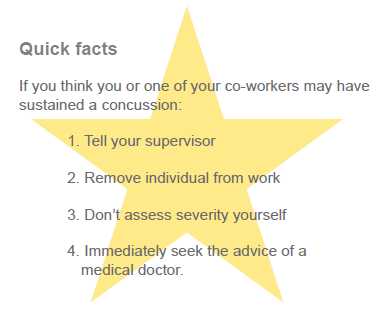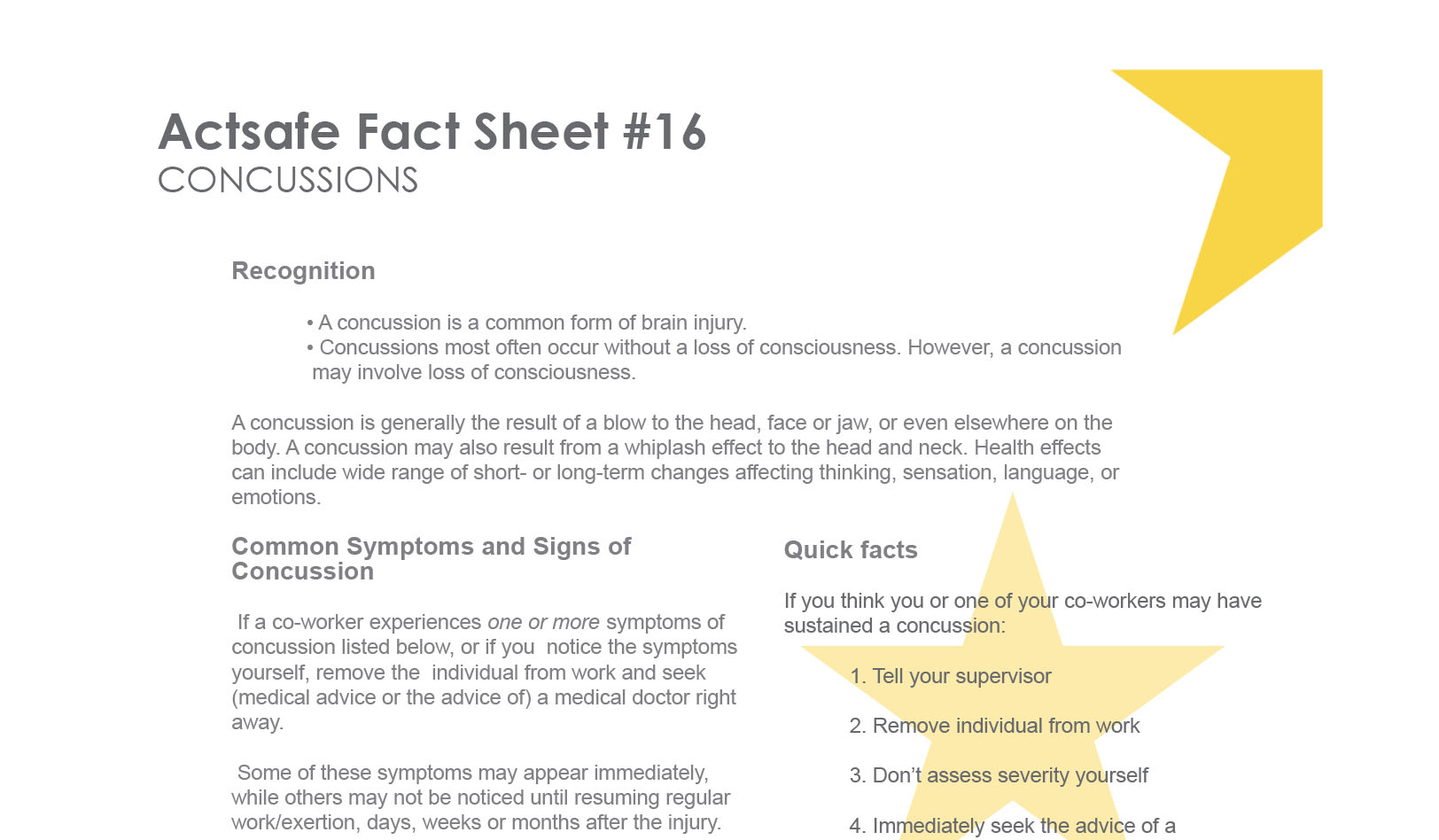Recognition
- A concussion is a common form of brain injury.
- Concussions most often occur without a loss of consciousness. However, a concussion may involve loss of consciousness.
A concussion is generally the result of a blow to the head, face or jaw, or even elsewhere on the body. A concussion may also result from a whiplash effect to the head and neck. Health effects can include wide range of short- or long-term changes affecting thinking, sensation, language, or emotions.
Common Symptoms and Signs of Concussion
If a co-worker experiences one or more symptoms of concussion listed below, or if you notice the symptoms yourself, remove the individual from work and seek (medical advice or the advice of) a medical doctor right away.
Some of these symptoms may appear immediately, while others may not be noticed until resuming regular work/exertion, days, weeks or months after the injury.

Symptoms (Noticed by Concussion Sufferer)
- Headache
- Ringing in Ears
- Dizziness
- Tiredness
- Feeling Dazed
- Nausea, Vomiting
- Seeing Stars
- Irritability
- Sensitivity to Light
- Confusion
- Disorientation
Symptoms (Noticed by Co-workers)
- Poor Balance or Coordination
- Slow or Slurred Speech
- Poor Concentration
- Delayed Response to Questions
- Vacant Stare
- Unusual Emotions, Personality Change
For a complete list of symptoms and signs click here.
What to do if a concussion may have occurred
- Tell your employer, supervisor or first-aid about the incident
- Remove the individual from work. Look for signs and symptoms of a concussion if they have experienced a bump or blow to the head or body. DO NOT try and judge the seriousness of the injury yourself.
- Seek advice from a medical doctor right away. Medical doctors have a number of methods that they can use to assess the severity of concussions. As a co-worker or supervisor, recording the following information can help health care professionals in assessing the individual after the injury:
- Cause of the injury and force of the hit or blow to the head or body
- Any loss of consciousness (passed out/knocked out) and if so, for how long
- Any seizures or memory loss immediately following the injury
- Number of previous concussions (if any)
- Keep the individual away from work the day of the injury and until a medical doctor says they are symptom-free and it’s OK to return to work. A repeat concussion that occurs before the brain recovers from the first—usually within a short period of time (hours, days, or weeks)—can slow recovery or increase the likelihood of having long-term problems.
Recovery
The best medical management for a concussion is rest, both physical and mental. Continuing topush yourself with work will likely make symptoms worse. Although, most people recover fully, improvement depends on a number of factors including injury severity, age and healthiness.
General Tips to Help Aid in Recovery:
- Get plenty of sleep at night, and rest during the day.
- Avoid activities that are physically demanding (e.g., heavy housecleaning, weightlifting/working-out) or require a lot of concentration (e.g., driving a car or balancing a chequebook). They can make your symptoms worse and slow your recovery.
- Describe your work and lifestyle to your medical doctor. When your medical doctor says you are well enough, return to your normal activities gradually, not all at once.
- Take only the drugs your health care professional has approved, and don’t drink alcohol until your health care professional says it’s OK.
It’s not courageous to return to work/performance before a concussion has been cleared by a medical doctor. It’s dangerous.
Prevention
Wear the Right Protective Equipment.
Protective equipment can reduce the risk and severity of injuries to the face and skull. It is important that helmets, hard hats or mouth guards are of high quality, well maintained and properly fitted, and are worn consistently and correctly.
Educate co-workers and supervisors about concussion.
Concussions are an invisible injury, making it important to share information on their seriousness with your co-workers. Should you or anyone else suffer one, this will help the team support and understand the situation.
Put a concussion action plan in place with your team.
To ensure that concussions are identified early and managed correctly, have an action plan in place before work begins. Ensure all co-workers are familiar with what to do if a concussion occurs through safety talks or a written plan describing prevention, recognition and response.
Get a baseline concussion test BEFORE an injury occurs.
Concussions can cause subtle changes in the speed and accuracy of thinking that are difficult to detect. Doctors can use the baseline test as a marker to know if you have regained pre-concussion function, allowing you to safely return to work sooner.
For Further Information:
Concussions and Mild TBI. US Centre for Disease Control and Prevention
Consensus Statement on Concussion in Sport. Think First
Mild Traumatic Brain Injuries (MTBIs) WorkSafeBC
Disclaimer
Details provided are for educational purposes only, supporting and not replacing advice from a medical professional. Actsafe has made responsible efforts to include accurate and timely information. However the organizations listed on this fact sheet make no representations or warranties regarding the accuracy of the information contained.



Share Now: